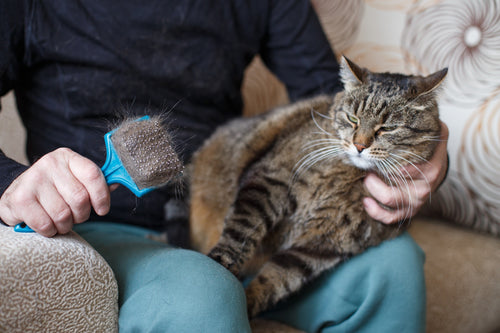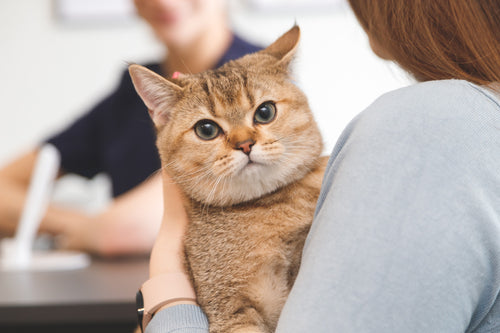Anxiety can affect dog behavior in a variety of ways, for a variety of reasons. Weather changes and summer thunderstorms may be causing your dog to respond with anxious behavior, or maybe your dog is experiencing separation anxiety as you return to the office. Perhaps your puppy is struggling when it comes to socializing, or your elderly pooch is experiencing age-related anxiety.
Regardless of your dog’s age, breed, health, or lifestyle, he may be prone to anxiety. As a dog owner, it’s important to understand the various causes and signs of dog anxiety, along with helpful remedies and care options.
Causes of Anxiety in Dogs
Before you start trying to treat your dog’s anxiety, it’s important to understand the type and cause of his anxiety.
The most common types of anxiety in dogs include:
Separation Anxiety
Separation anxiety is when your pooch feels distressed at the thought of being alone or away from you. A dog who tears the house apart when his owner is away isn’t simply behaving badly. Instead, he’s feeling genuine panic and acting out as a result.
Separation anxiety is often evidenced by chewed and torn objects around the house, scratches on doors and walls, and even attempts to escape.
Fear Anxiety
If your dog feels scared or stressed by loud noises such as fireworks or thunderstorms, being around too many strangers, or trips to the vet, he likely experiences fear-related anxiety.
Dog aggression generally doesn’t happen out of nowhere—if your dog is feeling stressed or anxious and doesn’t have a proper way to cope, he may begin acting out aggressively.
Generalized Anxiety
If “anxious” is one of your dog’s personality traits, he may have generalized or behavioral anxiety. Typically, generalized anxiety doesn’t have an obvious cause. In some cases, anxiety in dogs is inherited through genes.
Some dogs are more prone to anxiety for a few different reasons. For example, a dog who was never properly socialized may feel heightened anxiety around strangers or new experiences. A dog who was mistreated in the past may have an increased fear of abandonment or struggle with unfamiliar routines.
Dog anxiety can also be caused by health issues, or as a result of cognitive dysfunction due to aging.

How to Identify Anxiety in Dogs
Not all dogs exhibit the same behaviors when they’re feeling stressed. That being said, some common signs of a stressed out dog include:
- Destructive behavior
- Aggressive behaviors, such as growling and barking
- Restlessness
- Lethargy and depressive behavior
- Appetite changes
- Bathroom issues
- Excessive panting or drooling
- Whining or whimpering
- Social isolation
- Escape attempts
- Changes in body language (cowering with a tucked tail, tense and rigid posture, whale eye, etc.)
Never punish your dog for his anxiety-related behavior. This will not resolve the issue, and can even make it worse as it adds to the stress altogether.
Quick Tips for Thunderstorms and Fireworks
When your dog is feeling freaked out by thunderstorms and loud noises, resist the urge to react strongly as a way to soothe your pup. You may see it as calming and reassuring, but you don’t want to inadvertently teach your dog that his fear and anxious behavior is an appropriate response.
Instead, calmly bring your dog to a safe, quiet space—ideally without windows, or with blackout curtains. If it’s comforting for your dog, let him use his crate. It may also be helpful to cover the crate with a sheet or blanket, as long as there is proper air ventilation. If it’s making him feel trapped or confined, though, the crate may not be the best solution.
If they don’t add to the stress, you may want to turn on some calming background noise or a white noise machine. Keep your dog company while distracting him with fun games, familiar commands, treats, toys, and cuddles!

Tips for Easing Your Dog’s Separation Anxiety
Unlike thunderstorms and fireworks, dealing with your dog’s separation anxiety requires more of a long-term investment.
Start crate training as early as possible, and continue using the crate through adulthood. If your dog knows he can retreat to his own safe space anytime he feels anxious or panicked, he’s less likely to act out with bad behavior.
If your dog starts acting stressed as soon as he senses that you’re getting ready to leave, try distracting him with a treat or interactive toy while you leave the room for 10-15 minutes. Over time, gradually increase the amount of time that you’re gone so your pooch can adjust his expectations.
As with thunderstorms and fireworks, it can also be soothing for your dog to listen to music, the TV, or a sound machine while you’re out of the house to help him feel less alone. It may also be helpful to leave an object that has your scent… as long as it’s something you don’t mind being chewed!
When you leave and return home, make the ordeal as quick and casual as possible. If you don’t make a big scene, your dog will eventually learn that this is a normal part of your routine, and not a big deal.
Calming Your Anxious Dog
There are a variety of options and remedies when it comes to soothing your dog’s anxiety. Some dog anxiety can be kept at bay with enough exercise and mental stimulation, since excess energy can lead to anxiety in dogs. In other cases, a dog with anxiety may need to undergo behavioral training to learn effective coping mechanisms.
There are also several natural supplements and herbs that can help to soothe an anxious dog, such as melatonin, L-tryptophan, chamomile, valerian root, pet-friendly essential oils, and Pet Honesty’s Calming Hemp Chews. For added calming support, try our Premium Hemp Calming Chews with delicious, natural ingredients to help temporarily calm your canine.
Sources:
https://www.akc.org/expert-advice/health/treating-dog-anxiety/
https://vcahospitals.com/know-your-pet/signs-your-dog-is-stressed-and-how-to-relieve-it
https://www.petmd.com/dog/conditions/behavioral/c_dg_fears_phobia_anxiety
https://www.pethub.com/article/what-causing-my-dogs-anxiety






